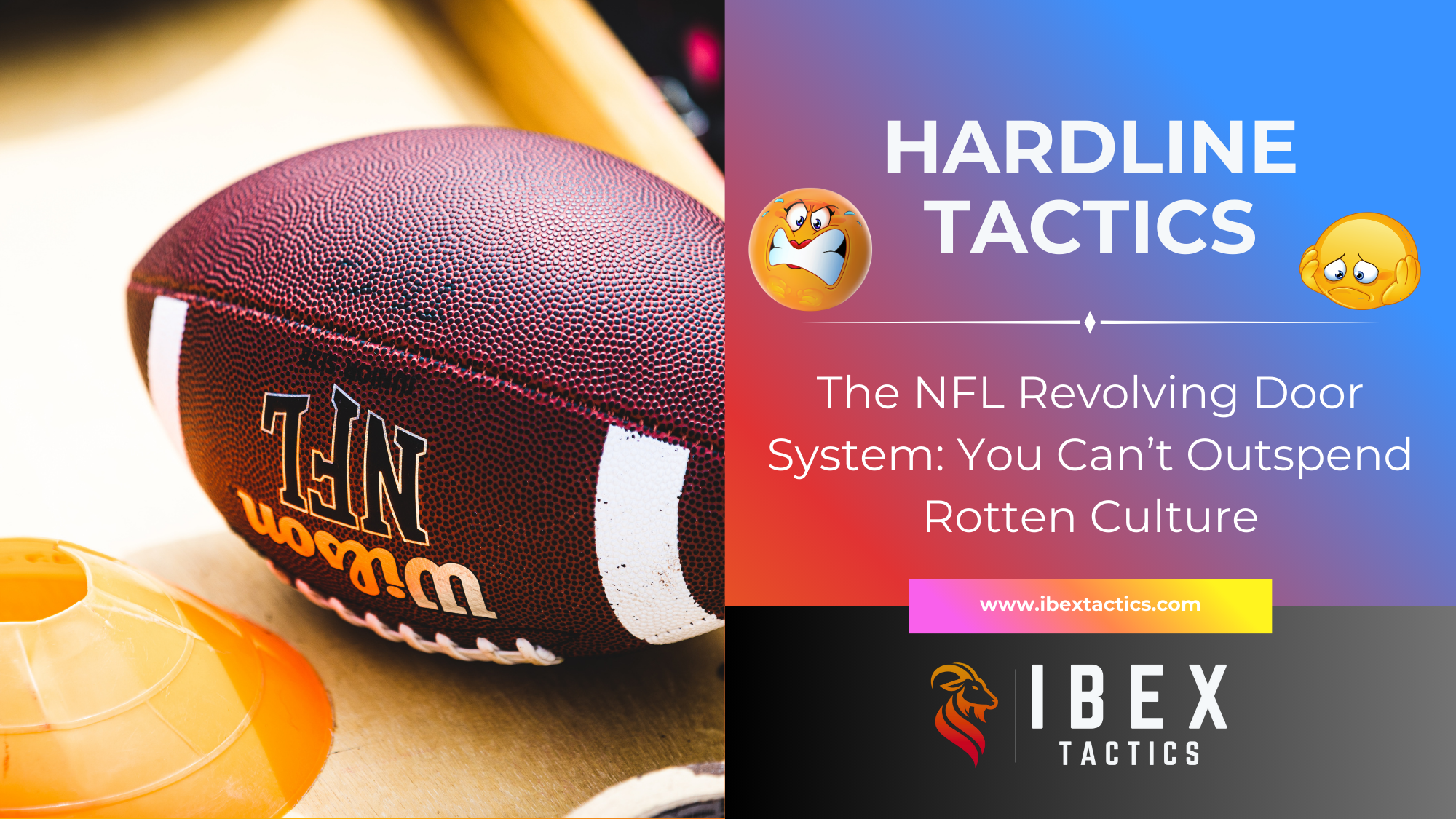Family On Three…Dysfunction On Four
About Case Study Authors
Ibex Tactics LLC, was founded by Alex Bolowich & Ben Foodman. Before starting the company, Alex and Ben were working with athletes on an individual basis, helping them improve their mental performance using sport psychology-based interventions. While both professionals had incredible success working with some of the world’s most elite athletes, a significant portion of the time they were unable to help some of their clients due to the poor cultures these athletes were immersed in. As a result, Alex and Ben created Ibex Tactics LLC, which dedicated towards providing science-driven solutions to helping teams build resilient cultures.
TABLE OF CONTENTS
INTRODUCTION: Sports Leadership Is Getting Exposed For One Common Reason
PART I. Leadership Won’t Stop Slobbering Over The Family Environment Lie
PART II. The War Between Boomers & Gen Z
PART III. Leadership does not understand that Gen Z is the ultimate bullsh*t detector
PART IV. Here Are 3 Things Leaders Can Do Today & Get A Quick Win For Their culture
Introduction: Sports Leadership Is Getting Exposed For One Common Reason
We are all aware of the massive changes happening throughout high school, college and professional athletics. The convergence of Name Image & Likeness (NIL), the transfer portal, artificial general intelligence, social media, and new legislations such as the House Act have completely changed the power dynamics between athletes & organizational leadership. Despite these changes many leaders are not adapting to these seismic evolutions, and because many of them don’t recognize this weakness within themselves, their respective organization pays a heavy price in the form of burnout, high turnover, toxic-culture, etc.. Because this is such a common issue that we run into at Ibex Tactics, we wanted to dive deeper into a specific, yet common toxic side-effect that has been occurring as a result of this lack of understanding and inject a major dose of reality to help get leaders focused on recognizing how they are getting cooked for this problem. Let’s dive in!
Part I. Leadership Won’t Stop Slobbering Over The Family Environment Lie
In our conversations with support staff, athletes, and even high-ranking officials in top tier athletic departments, it is apparent to nearly everyone in those organizations that the upper echelons of leadership are completely disconnected from the harsh environment that is college athletics. For example, one of the most common approaches leadership attempts to utilize in order to mask the chaos is by describing their athletic department (or sports team) as a ‘family environment’. By doing this, they falsely believe that this will create the necessary “belonging cues” that recruits and prospective coaches would want to hear to commit to their school. Spoiler alert, it’s gross and no one believes it anymore!
But please, don’t take our word for it. In a recent article in the Harvard Business Review, the authors cite multiple sources that explain why “family environments” consistently produce some of the most toxic workplace cultures in business and sports. Per the authors:
If you’re promoting a family culture, does that make the employer the parents and the employees the children?
Not everyone has a good relationship with their parents or siblings and emotions from family dynamics can easily bleed into professional relationships, if allowed.
These dynamics can also leave employees feeling unempowered (the parents usually decide, and the children follow orders) to stand up for themselves and take on work that falls outside of their comfort zone.
This allows personalities and pre-determined dynamics to take precedent over what is expected to do their job well.
Another problem arises when it comes down to letting someone go or sharing constructive feedback. In a “family” culture, it almost always will feel personal.
You don’t fire a family member, nor do you put them through performance improvement plans.
Relationships between employees and employers are temporary in nature, and at some point, have to come to an end.
So to liken the relationship to a family creates an allusion that the bond will last indefinitely. You’ll also risk masking illicit behavior among close-knit coworkers, because how often do you tattle on your family? Studies show that employees who operate within a “familial culture” often fail to report any wrongdoing when they feel closer ties to the perpetrator. Feelings of fear the damage might cause to the perpetrator keep fellow employees quiet and complicit.
Part II. The War Between Boomers & Gen Z
So what is really going on here? Why are the leaders in the upper echelon of their organizations so hell bent on continuing to use descriptions such as “family environment” or other forms of communication when trying to create alignment within their ranks? It’s because there is a huge disconnect between boomers (to a certain extent older millennials too) and Gen Z. Leadership within athletic departments and sports teams tends to be compromised of individuals who are more senior. For example, some research indicates that the average age of college athletic directors is 52 years of age. Individuals who fall into this age category grew up in a version of America where the social and cultural norms were completely different then today. Since their inception, individuals who are a part of Gen Z have had their entire lives cataloged and stored in digital spaces on a nonstop basis, whereas older individuals have not had as much exposure to technology at the early stages of their lives.
This lack of exposure would allow individuals to maintain a sense of privacy, while also being a part of the collective to focus on the greater good of a team. That privacy allowed for healthy boundaries between an individual’s personal and professional life. Because Gen Z athletes and coaches did not come up in that space, they have been inundated with the importance of individualism (e.g. posting your highlights on social media, accruing followers on social media platforms, etc.) and have not been afforded the same boundaries. We aren’t saying that individuals who are a part of Gen Z are selfish…quite the opposite. What we are trying to convey is that Gen Z has arguably had a much more difficult road to navigate in terms of these rapid changes occurring in American social dynamics and have had to find creative ways to balance the importance of individualism and sacrificing for the collective. But there is one key factor that Boomers continuously overlook when interacting with Gen Z, which is a cause of constant frustration for both generations.
Part III. Leadership does not understand that Gen Z is the ultimate bullsh*t detector
Because Gen Z has grown up on the internet, they have constantly been spammed with fake news, bots, misinformation, and the “influencer” class. Because it is so difficult to sort out fact from fiction in these spaces, Gen Z has become the ultimate bullshit detector. Unfortunately, most leaders in athletics do not understand this and continue to use outdated communication techniques such as the dreaded “family environment” lie! To be fair, many leaders mean well and just want to create a welcoming environment. Odds are, they probably heard one of their colleagues describe their team as a family environment, claiming to have had success with this approach.
But as we have demonstrated to you through research, statistically speaking family environments (and similar methods of communication) will only make your environment more repulsive and will drive away top talent from your organization. For most leaders, it’s probably not their fault that they mistakenly use ineffective communication methods…but it is their problem! Because leadership within these departments are going to need every advantage to remain competitive in the brutal world of elite-level athletics, they need to adapt and stop using these outdated communication methods. But what else can leadership do to more effectively communicate with younger generations?
Part IV. Here Are 3 Things Leaders Can Do Today & Get A Quick Win For Their culture
First quick win leaders can get for their organization…
Stop Referring To Your Team As A Family Environment!!!!
Boom! Quick win number 1. Now, here is the next tool leaders can use to help create the belonging cues they want to send to their prospective talent without the toxic, nuclear firestorm, fallout that the “family environment” creates. USE THIS LINK HERE to take you to the tool and start transforming your culture today! Finally, if leaders want to do a thorough assessment of where their culture stands, we are unlocking our premier A-5 Assessment for FREE! Use the link below to learn more about how the A-5 can help you measure and improve your team’s culture.
NOTE TO READER:
Alex and Ben wanted to compile their expertise in the Ibex Tactics Case Studies to help teams in the sports and corporate sector better understand how many of the issues they are dealing with are more often than not related to culture. Most teams recognize that culture is an important component of their success, but do not always have the resources or expertise to analyze the complexity of culture. If you are interested in learning more about the services that Ibex Tactics offers to help with culture development, use the contact form below and sign up with your email to receive updates on new services and case studies!
Start your application today!
Are you looking for a way to enhance your organization’s performance outcomes? Are you curious to learn more strategies that can enhance your team culture? Use the form below to begin the application process to start the process of getting on our client list!
ARE YOU A PART OF THE HERD?!
Make sure you stay up to date on new case studies, services and relevant updates about Ibex Tactics! Don’t wait! Sign up below!


















